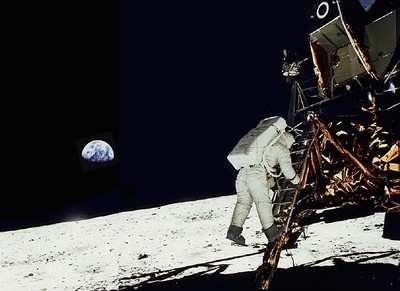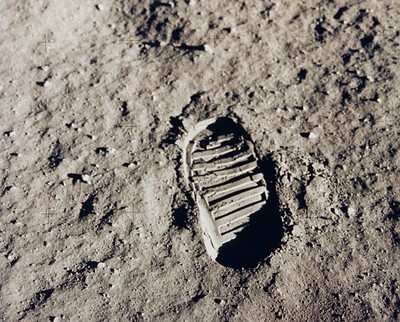Wed, Jul 21, 2004
35th Anniversary Of Apollo Moon Landing And NASA Is Looking
Ahead
The success of the Apollo 11 mission that landed NASA astronauts
Neil Armstrong and Edwin "Buzz" Aldrin on the Moon July 20, 1969,
was a defining moment that opened a new era in human history.
Today, as NASA marks the 35th anniversary of that first lunar
landing, the Marshall Space Flight Center in Huntsville (AL)
celebrates the role it played in the Apollo program. Under the
leadership of its first director, Dr. Wernher von Braun, the
Marshall Center developed the Saturn V rocket that carried our
astronauts to the Moon.

In a post-flight press conference, Armstrong called the flight
"a beginning of a new age." Even then, Astronaut Michael Collins --
who orbited the Moon in command module Columbia while his
colleagues made the historic Moon landing in their lunar module
Eagle -- talked about future journeys to Mars.
"The world experienced its greatest technology achievement when
NASA astronaut Neil Armstrong first stepped on the surface of the
Moon, taking a "giant leap" for humanity. That event captured the
imagination of the nation and inspired a new generation of space
explorers," said Marshall Center Director David King. "As we
observe this anniversary NASA is embarking upon a new journey of
discovery."

The Marshall Center is looking to the future, working to fulfill
its role in implementing the Vision for Space Exploration which
calls for a return to the Moon followed by human and robotic
journeys of discovery to other destinations in the solar
system.
The Marshall Center, with its expertise in space transportation
systems, space propulsion, microgravity science, space systems and
more, will play a significant role in fulfilling the Vision for
Space Exploration. Goals include safely returning the Space Shuttle
to flight; focusing the use of the Shuttle to complete assembly of
the International Space Station; and retiring the Shuttle as soon
as the Space Station is completed, around the end of the
decade.

NASA's longer terms goals, which will unfold over future
generations, include:
- A sustained and affordable human and robotic program to explore
the solar system and beyond. Extending human presence across the
solar system, starting with a human return to the Moon before the
year 2020, in preparation for human exploration of Mars and other
destinations.
- Developing innovative technologies, knowledge and
infrastructures to explore and support decisions about the
destinations for human exploration.
- Promoting international and commercial participation in
exploration to further US scientific, security and economic
interests.
More News
Pilot Also Reported That Due To A Fuel Leak, The Auxiliary Fuel Tanks Were Not Used On June 4, 2025, at 13:41 eastern daylight time, a Piper PA-23, N2109P, was substantially damage>[...]
Have A Story That NEEDS To Be Featured On Aero-News? Here’s How To Submit A Story To Our Team Some of the greatest new stories ANN has ever covered have been submitted by our>[...]
From 2023 (YouTube Edition): Reflections on War’s Collective Lessons and Cyclical Nature The exigencies of war ought be colorblind. Inane social-constructs the likes of racis>[...]
Aero Linx: Colorado Pilots Association (CPA) Colorado Pilots Association was incorporated as a Colorado Nonprofit Corporation in 1972. It is a statewide organization with over 700 >[...]
High Speed Taxiway A long radius taxiway designed and provided with lighting or marking to define the path of aircraft, traveling at high speed (up to 60 knots), from the runway ce>[...]
 NTSB Prelim: Piper PA-23
NTSB Prelim: Piper PA-23 ANN FAQ: Submit a News Story!
ANN FAQ: Submit a News Story! Classic Aero-TV: One Mans Vietnam
Classic Aero-TV: One Mans Vietnam ANN's Daily Aero-Linx (07.03.25)
ANN's Daily Aero-Linx (07.03.25) ANN's Daily Aero-Term (07.03.25): High Speed Taxiway
ANN's Daily Aero-Term (07.03.25): High Speed Taxiway





